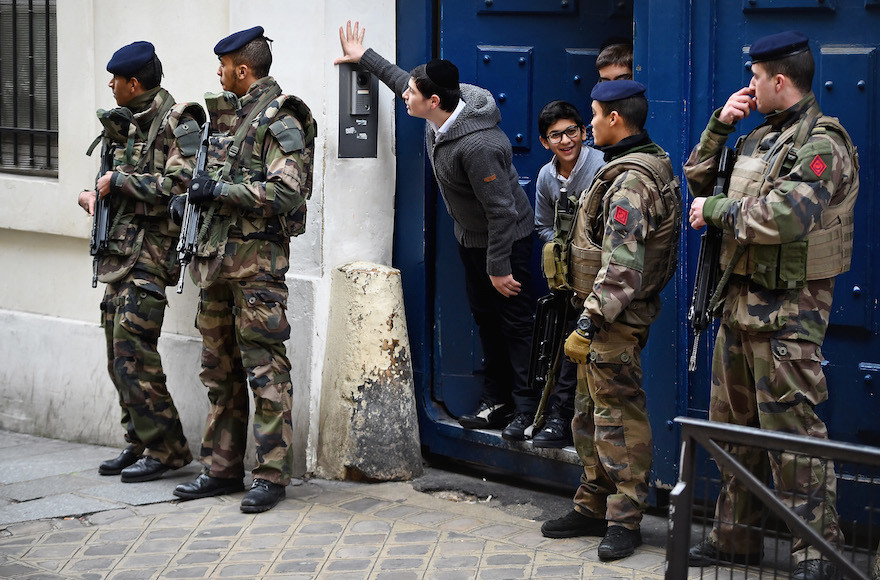Safer in America than in Europe, but it’s not a lock
It's better here: That was the message of a panel of experts considering the rise of the extreme right and of anti-Semitism in the United States and Europe.
That was the good news at the forum Monday sponsored by Georgetown University's Center for Jewish Civilization. No one, however, could quite pin down why Americans were more resistant to anti-Semitism than Europeans.
"It's far from perfect," said Ira Forman, until January the international anti-Semitism monitor for the State Department. "We do it now better than we did 50 years ago, there's no guarantee we will continue to do it, and frankly, we do it better with anti-Semitism than with anti-Muslim rhetoric and with racism."
Forman cited American communities that spontaneously rallied to counter anti-Semitism in their midst, notably the citizens of Whitefish, Montana, who a year ago demonstrated ahead of a planned neo-Nazi march targeting the town's tiny Jewish community, and Oklahoma civic leaders in 2013 who called on a state lawmaker to apologize for using the phrase "jew down."
In both cases and in many others, he said, the drive to counter anti-Jewish rhetoric came in communities with few Jews and seemed driven more by non-Jews who were repelled by the rhetoric.
Heidi Beirich, the director of the Intelligence Project at the Southern Poverty Law Center, added to that list the nationwide drive among Muslims last year to raise funds to pay for vandalized Jewish cemeteries.
Michael Whine, the government and international affairs director for the British Jewish community's Community Security Trust, said leaders on his continent were doing the necessary work speaking out against bias crimes, but he agreed with Forman that the message was not trickling down to the average European.
"There are a lot of European states where civil society is not at all developed," he said. This was in part because in countries that emerged from autocracy just in recent decades, suspicions of government lingered, and hampered efforts to join civilians and authorities in countering hate crime.
"Often, civil society is reluctant to deal with the government," Whine said.
On Friday, the World Zionist Organization released a survey comparing perceptions of anti-Semitism in the United States and Europe showing that 51 percent of respondents in Europe said that wearing Jewish symbols in public made them feel unsafe. In North America, the figure was 22 percent.
The panelists at the event, which was held at the National Press Club, noted that there has been an intensification of anti-Semitic rhetoric in the United States.
Beirich said she did not anticipate the virulence of the anti-Jewish rhetoric at last year's "Unite the Right" march in Charlottesville, Virginia.
"The organizations here in the States are becoming much more Hitleresque," she said. Previously, these organizations had focused more on preserving vestiges of white privilege. "They're becoming much more about ethnic cleansing and the Jews, they're chanting 'Jews will not replace us.' That is not something commonly heard at previous events.'"
Beirich added that social media and the internet made it easier to disseminate hate. Extremists may be based in Europe, but their messages are getting through to Americans.
"We now have certain websites that have 750,000 views a month among Americans," she said.
The panelists agreed that social media giants like Facebook and Google had become more receptive to keeping hate off their networks, in part because of laws in some European countries that hold them accountable for incitement.
"Both France and Germany have promised to prosecute Facebook and Google if they don't act," Whine said.
Beirich noted that expressions of anti-Semitism had spiked during Donald Trump's 2016 presidential campaign and since he was elected.
Forman, a Democrat who for decades helmed the National Jewish Democratic Council, cautioned against making anti-Semitism a partisan issue. He noted Trump's equivocation after the Charlottesville march, which included a deadly attack by an alleged white supremacist on counterprotesters. But he also stressed that calls on Trump to speak out more forcefully came from both sides of the aisle.
"I don't want to make it about ideology, I don’t want to make it about partisanship -- that’s a very, very bad path to go down," he said in response to a question about Trump's role in the increase of biased rhetoric.
It is critical, panelists said, not to treat anti-Jewish bias in isolation. Whereas Jews in Europe faced an intensification of anti-Semitic rhetoric and hate speech, other minorities in Europe were facing spikes in violence, including Muslims, Roma and the LGBTQ communities.
Forman noted the violence of the Golden Dawn, a Greek fascist group, which has targeted mostly Roma.
"It has a street militia," he said. "Jews haven't got hit," despite Golden Dawn's anti-Semitic rhetoric. "The Roma have."
Moderating the panel was Rabbi David Saperstein, the former ambassador-at-large for international religious freedom under the Obama administration and the director emeritus of the Reform movement's Religious Action Center.

 54.0°,
Mostly Cloudy
54.0°,
Mostly Cloudy 




